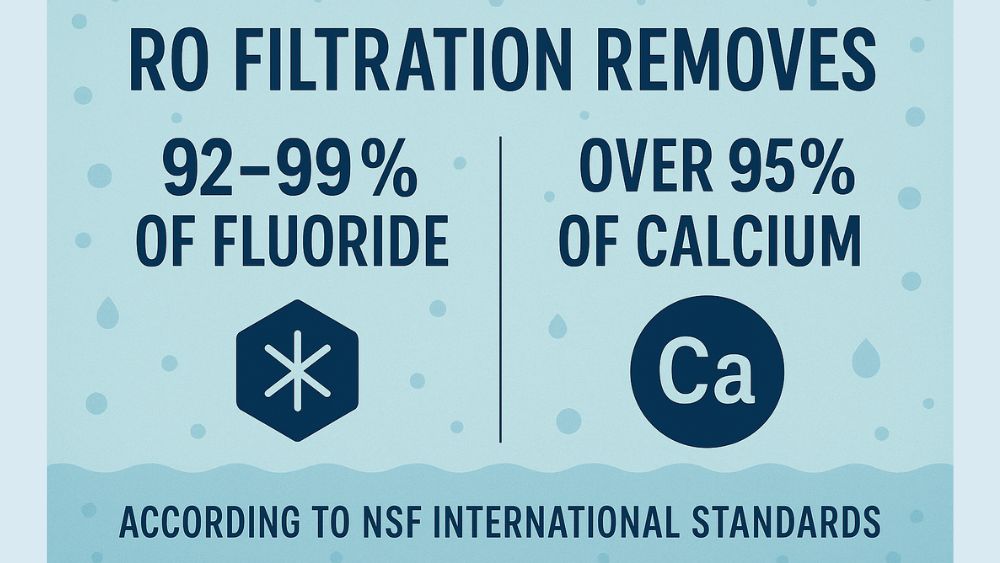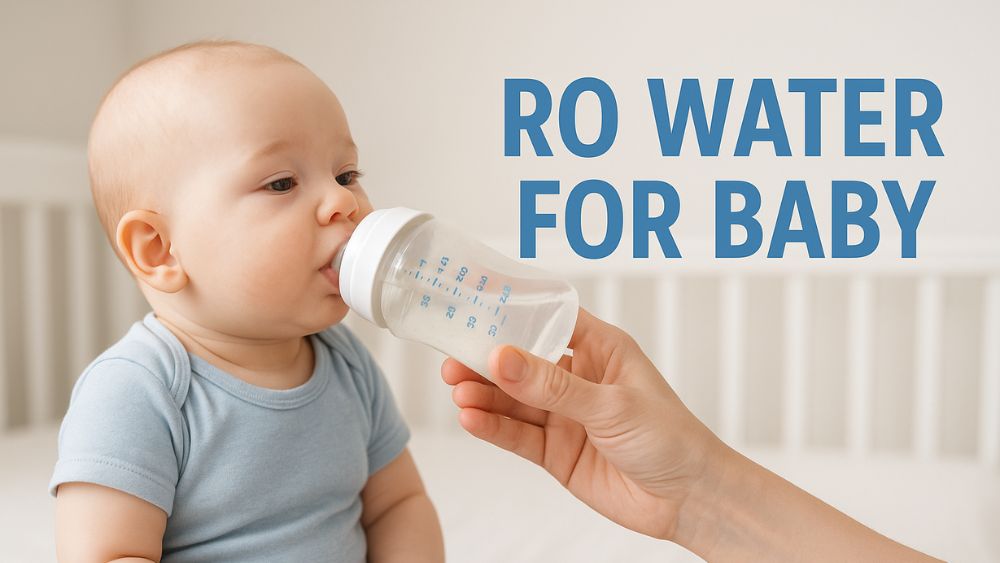As a parent, every decision you make regarding your child’s health is crucial, especially when it comes to something as essential as water. You might have heard about Reverse Osmosis (RO) water systems and wondered: Is RO water safe for babies? The answer isn’t as straightforward as a simple yes or no. In this article, we’ll break down the facts, concerns, and expert opinions so you can make an informed decision.
What Is RO Water?
RO (Reverse Osmosis) is a water purification process that removes dissolved salts, impurities, and contaminants by passing water through a semipermeable membrane. RO systems are highly effective in filtering out:
-
Heavy metals like lead, arsenic, and mercury
-
Harmful microbes and bacteria
-
Pesticides and industrial chemicals
-
Hardness-causing minerals like calcium and magnesium
The result? Clean, purified water, but also water that may be too stripped of essential minerals.
Why Water Matters So Much for Babies
Infants, especially those under six months, are extremely sensitive to what they consume. Their immune systems and kidneys are still developing, making them more vulnerable to water contaminants. That’s why many parents turn to purified water for preparing infant formula or even drinking (after six months).
But does RO water tick all the boxes?
The Pros of Using RO Water for Babies
1. Free of Harmful Contaminants
RO water is virtually free of pollutants, which is especially important in areas with questionable tap water quality. If your tap water contains lead, nitrates, or other toxins, an RO system could be a lifesaver.
2. Better Than Bottled Water
Many bottled waters are simply glorified tap water and may not be suitable for infants due to high mineral content or unclear purification processes. RO water offers a more consistent quality, especially when maintained properly.
3. Safe for Formula Preparation
When boiled, RO water becomes one of the safest options for mixing formula, assuming the TDS (Total Dissolved Solids) levels are within the recommended range (typically 30–75 ppm for infants).
The Concerns About RO Water for Babies
1. Lack of Essential Minerals
RO systems remove nearly all minerals from water, including calcium, magnesium, potassium, and fluoride, all of which are important for a baby’s growth and development. While infants get most of their nutrients from breast milk or formula, long-term exposure to mineral-deficient water can be a concern if used excessively.
2. Over-Purification and pH Imbalance
Some experts argue that RO water is “too pure.” With a very low TDS and acidic pH, it may not be ideal for long-term use without remineralization. Water that is too acidic can affect digestion and metabolism.
3. Storage and Contamination Risk
RO systems store water in tanks, and if not cleaned regularly, bacteria can accumulate. It’s vital to ensure regular maintenance and filter replacements.
What Pediatricians and Health Experts Say
Most pediatricians agree that clean, contaminant-free water is critical for babies. However, they often recommend using boiled, cooled water with a balanced mineral profile for infant formula. Here’s a summary of medical advice:
-
Under 6 months: Babies should primarily consume breast milk or formula. If water is needed (e.g., for formula preparation), it should be boiled, cooled RO water or distilled water with acceptable TDS levels.
-
6 months to 1 year: Small amounts of water may be introduced. RO water is safe if the system is well-maintained and the water is remineralized or has safe TDS levels.
-
After 1 year: RO water can be safely consumed, but ensure a balanced diet to compensate for lost minerals.
Tips for Safely Using RO Water for Your Baby
-
Check TDS Levels Regularly: Use a TDS meter to ensure your water isn’t too low in minerals (ideal for infants: 30–75 ppm).
-
Use Boiled and Cooled RO Water for Formula: This ensures both microbial and chemical safety.
-
Add a Remineralization Filter: If your RO system lacks one, consider installing it. It restores healthy minerals to the water.
-
Maintain Your RO System: Change filters on time and sanitize tanks to prevent bacterial growth.
-
Avoid Storing Water for Too Long: Freshly purified water is always safer.
Data Point: Ideal water for infant consumption should have TDS levels between 30–75 ppm (Indian Council of Medical Research, 2021).
So, Is RO Water Safe for Babies?
Yes, with proper precautions. RO water, when used wisely, is among the safest water sources for infants, especially in areas with unsafe tap water. The key is to ensure the RO system is well-maintained and that mineral levels are monitored or restored when necessary.

Is RO water safe for newborns under 6 months?
For newborns under 6 months, direct consumption of any water is not recommended, including RO water. However, RO water can safely be used to prepare infant formula, provided it is boiled and cooled before use. RO water has a very low Total Dissolved Solids (TDS) level, often between 10–50 ppm, which is below the WHO guideline of <100 ppm for infant-safe water.
Reference: World Health Organization – Guidelines for Drinking-water Quality (4th edition, 2022)
Can babies between 6 to 12 months drink RO water directly?
Yes, in small amounts. Once babies begin solid foods at 6 months, limited amounts of water can be introduced. RO water is suitable at this stage if its TDS is within 30–75 ppm and the system is well-maintained. Pediatricians suggest using boiled and cooled RO water to minimize microbial risk.
Data Point: Ideal water for infant consumption should have TDS levels between 30–75 ppm (Indian Council of Medical Research, 2021).
Is RO water better than boiled tap or bottled water for babies?
Yes. While boiling kills microbes, it doesn’t remove heavy metals or dissolved salts. RO water, in contrast, removes up to 99% of all contaminants, including:
-
Lead (Pb)
-
Arsenic (As)
-
Nitrates
-
Chlorine
-
Microplastics
It also eliminates pathogens and viruses. Bottled water may still contain unknown mineral content or microplastic contamination, making RO the safer long-term choice.
EPA Study (2020): RO systems reduce 99.9% of contaminants, outperforming other household filters.
Are there any medical reports cautioning against RO water for infants?
There are no major medical reports warning against RO water specifically. However, studies advise caution with low-mineral or demineralized water, as it may lack calcium and magnesium, essential for baby growth.
Doctors recommend using remineralized RO water or ensuring adequate minerals from formula and food.
Reference: WHO Report on Nutrients in Drinking Water (2005) — warns against prolonged use of demineralized water without dietary compensation.
Does RO water affect calcium and fluoride intake in babies?
Yes, RO removes both calcium and fluoride — vital for bone and dental development. However, infants typically receive these from breast milk or fortified formula. Still, remineralization filters or drops are recommended to restore minerals in RO water.
Fact: RO filtration removes 92–99% of fluoride and over 95% of calcium, according to NSF International standards.
What’s the safest way to prepare formula with RO water?
-
Boil RO water for at least 1 minute to eliminate any residual microbes.
-
Cool it to body temperature (~37°C or 98.6°F).
-
Mix formula powder following manufacturer instructions.
-
Use within 2 hours or store in the fridge (max 24 hours).
CDC Guidelines for Infant Formula Preparation (2023) recommend using boiled water if the baby is under 3 months or immunocompromised.
Why is RO considered the best filtration method for baby-safe water?
Answer:
RO (Reverse Osmosis) is widely regarded as the most effective filtration technology, thanks to its multi-stage purification, which includes:
-
Sediment filter (removes dust/rust)
-
Carbon filter (removes chlorine, odors)
-
RO membrane (removes up to 99.9% of dissolved salts, metals, bacteria)
-
Post-carbon/remineralization (taste and mineral balancing)
This layered system makes RO water safer than UV, UF, or basic carbon filters, especially in regions with poor water quality.
NSF Certification reports RO filters reduce over 80+ contaminants — more than any other domestic water filter.
Final Thoughts
As with most things in parenting, balance is key. RO water can provide peace of mind, but you must stay vigilant about its quality and composition. If you’re ever unsure, consult with your pediatrician, especially when preparing formula or introducing water for the first time.

Hasan Al Sarker is a Reverse Osmosis Specialist. He has worked for many years to ensure safe drinking water for all. His research paper has been published in several journals, including Issue, Medium, and Slideshare. He is recognized as a water doctor among specialists though he did not attend medical college.
Besides working as a researcher of reverse osmosis technology, he is also very fancy with the kitchen and cooking. His guides are reading thousands of people every day. As a head of content, he is responsible for all the published articles at RO System Reviews.

